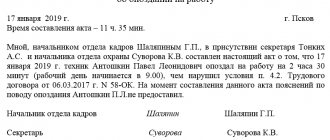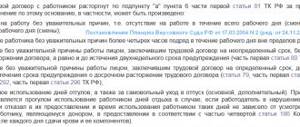Hello! In this article we will tell you everything about being late for work.
Today you will learn:
- What is considered late?
- How is being late different from absenteeism?
- What sanctions can be applied to an employee for non-compliance with labor discipline.
- Instructions for dismissing an employee for being late.
What is considered late for work?
When a person is at the workplace, he is obliged to obey the charter of the enterprise and the work schedule. An employee does not have the right to come to work whenever he wants (exception if the position provides for a flexible schedule).
Some irresponsible employees believe that being a little late will not entail any consequences. But this is a misconception. First, let's figure out what is considered late.
Lateness is the absence of an employee from the workplace for any reason from 1 minute to 4 hours.
Some managers allow employees to be late by up to 5 or 15 minutes. But this is at the discretion of the authorities. However, if such violations are systematic, then sooner or later the employer will get tired of such negligent attitude towards labor regulations.
The Labor Code says nothing about the concept of “lateness”. It is called differently - violation of discipline.
Let's look at examples of delays:
- Absence of an employee at the beginning of the working day;
- Late return of the employee from lunch break;
- Leaving the workplace on your own initiative without warning anyone;
- An employee leaving work before the end of the working day.
When hired, each employee signs an employment contract, which spells out all the rules of the enterprise and the daily work schedule.
If this agreement does not contain a clause on lateness, or the employee for some reason was not familiarized in writing with the rules of being in the workplace, he cannot be held accountable. Otherwise, he can go to court.
Reasons for being late for work for which you are punished
There are no gradations of reasons for the duration of lateness, just as the concept of “systematic lateness” does not exist. Any lateness is considered as a violation of discipline.
In the absence of valid reasons, management may first reprimand the employee, reprimand him, and if the offense is repeated, dismiss him (Article 192 of the Labor Code of the Russian Federation). Dismissal is also possible in case of a single absence from the workplace for more than 4 hours.
In this regard, someone who is late 3 times by 5 minutes is formally at a greater disadvantage than someone who is late once by 3 hours. The first has repeatedly committed misconduct, and for this he may be fired, and the second, despite the fact that he has been absent from work longer, will only receive a reprimand or reprimand, since he did not exceed the 4-hour limit established by law.
However, this does not mean that the employer can apply enforcement measures indiscriminately.
The Labor Code requires that the degree of violation be weighed against the punishment assigned for it (Part 5 of Article 192 of the Labor Code of the Russian Federation).
If a dismissed employee goes to court in search of justice, the employer will have to provide evidence of the severity of the crime.
What types of penalties can be applied to an employee for being 15 minutes late, ConsultantPlus experts told. Access the system for free and proceed to the explanations.
Late for a valid reason
If you are a strict manager and notice that your subordinate is absent from the workplace, do not rush to punish him. First, you need to figure out what caused the delay, because force majeure circumstances happen in the life of any person.
Not every person can be punished for being late. Such violations are divided into lateness for a valid reason and for an unexcused one.
Valid reasons:
- Employee illness;
- Illness of his relatives and close people (for example, a child);
- Death of one of the relatives;
- Natural disasters, accidents, etc.
Any lateness for a valid reason must be documented. This could be sick leave or other medical certificates.
If you were flooded by your neighbors, then a certificate from the housing office; if you were in a car accident, a certificate from the traffic police; if the fault was due to broken public transport, a certificate from the motor vehicle transport service that services this route.
A traffic jam is not considered late for a valid reason.
Valid reasons for being late
An employee may be late for work not only because he overslept or watched TV for a long time in the morning, but also because of objective circumstances - for example, if he has health problems or his car breaks down.
The list of valid reasons for being late for work is not established by law, so the employer evaluates them independently. Obviously, if there are documents, for example a certificate issued by an emergency doctor, being late cannot be considered a violation of labor discipline.
If there are no documents, the basis for making a decision will be the employee’s explanations - both oral and written.
What is the difference between being late and absenteeism?
Sometimes managers mistakenly assume that being late and absenteeism are the same thing. But that's not true.
Let's look at the main differences in the table.
| Criteria | Late | Absenteeism |
| Classification | Violation | Serious violation |
| Time frame | Absence of an employee from his workplace from 1 minute to 4 hours | Absence from work or absence without notifying superiors for 4 hours or more |
| Punishment | Reprimand, reprimand, dismissal (you cannot be fired for one delay) | 1 absence = dismissal |
| Where is it fixed? | In the access system (if there is one) | On the time sheet |
| Design features | An explanatory note, an act of lateness, an order for collection are drawn up | The manager has the right not to demand explanations from the violator and not to draw up any acts. He can issue an order on his own initiative and dismiss the employee |
Punishment for being late
Being late is not considered a serious violation, so punishment can only be disciplinary.
These include:
- Note – if the employee was late once;
- Reprimand – 2 or more latenesses;
- Severe reprimand – delays are systematic;
- Dismissal – regular lateness (3 times or more).
If the reason for being late was valid, and the employee has documented this, then no punishment will be imposed.
For 1 such violation, one disciplinary sanction is provided. The manager can apply punishment within 6 months after the violation. All penalties are canceled after 1 year.
If an employee has been reprimanded for a violation, the manager may remove it before the 12-month period, provided that this does not happen again.
The manager may impose a fine or reduce wages for lateness. This is contrary to the Employment Agreement. If this is allowed at an enterprise, then management may be held administratively liable.
What punishment can you bear for being late for work?
Leaders of some organizations often try to be understanding about minor delays. Sometimes a person may arrive later than the allotted time not due to malicious intent, but due to circumstances beyond his control. For example, due to problems with transport or due to unfavorable weather conditions.
But, despite the kindness of your superiors, you should not use this opportunity all the time. A negligent attitude towards work procedures will bore even the most understanding manager, and then responsibility cannot be avoided.
Although there is no specific punishment for being late for work under the Labor Code (as, for example, for absenteeism in the form of dismissal), it is a condemned form of behavior. Late arrival is a violation of labor discipline. Therefore, according to Art. 192 of the Labor Code of the Russian Federation, the employer has the right to punish an employee even for being 2 minutes late for work as follows:
- make a remark - if the employee committed a similar offense once;
- reprimand - if a person has violated the rules two or more times;
- The last resort is dismissal. It is resorted to if an employee regularly (maliciously) comes to work later than expected and has a valid penalty.
The Labor Code of the Russian Federation indicates what type of liability is provided for being late for work: disciplinary. Administrative and criminal are not provided for, since issues of violation of internal regulations violate only the interests of the employer, but not public or state ones. Material sanctions of the Labor Code of the Russian Federation have not been introduced, but the employer has the right to adopt a local regulatory act and specify compliance with discipline as a condition for receiving a bonus. In this case, a delay in reporting to the place of duty is grounds for deprivation of the incentive portion of earnings.
If it turns out that a person had a good reason to stay late and he documented this (for example, an employee’s child fell ill, and he can confirm this with a certificate from a medical institution), then no punishment will be imposed.
ConsultantPlus experts examined whether it is legal to bring disciplinary action for being late if an employee forgot his pass and his time of arrival for work was not recorded on time by the electronic pass system. Use these instructions for free.
Step-by-step instructions for dismissal for being late
According to the Labor Code of the Russian Federation, it is impossible to fire an employee for one delay. If an employee systematically violates labor discipline, the manager has the right to dismiss the negligent employee on his own initiative in accordance with Article 192 of the Labor Code of the Russian Federation.
The sequence of actions in this case is as follows:
- When the employee is late for the first time, he is obliged to write an explanatory note, where he will state the reason for his action and attach the available certificates to the document. This must be done within 48 hours.
- If within 2 days the employee does not provide the appropriate note and refuses any explanations, a Statement of Refusal of Explanations is drawn up in the presence of 3 witnesses.
- If the reason is not valid, then a lateness report is drawn up. This document must be signed by 2 witnesses who confirm the fact of the violation.
- If the violation is identified by the head of the unit, who does not have the right to impose a penalty, he writes a report addressed to his management and attaches the necessary documents.
- After this, the head of the company sets a date and time for the analysis, where all involved persons are invited.
- Based on the drawn up act and the analysis carried out, the enterprise issues an order, which will indicate the sanctions applied to the violator.
- After this, it is necessary to familiarize the employee to whom the penalty is being applied with the order. If an employee refuses to sign an order, then a corresponding act is drawn up and signed by 3 witnesses.
- The second delay is processed in the same way as the first.
- If the employee is late for the third time, the manager may fire the employee on his own initiative. In this case, the following reason should be indicated in the work book: “Systematic violation of labor discipline.”
Is it possible to fire someone for being late?
If a person is systematically late, for example, more than three times, then he may be fired. A similar measure is applied to employees on whom a penalty has already been imposed; it has not been repaid at the time of the repeated violation.
The second delay, like the subsequent one, is processed in accordance with the first. After the third time, the employer has the right to issue an order establishing the procedure for terminating an employment contract with a citizen. The reason is a systematic violation of labor discipline.
PLEASE NOTE: the law does not establish an obligation for the employer to urgently take punitive measures against the offender. The deadlines are established in the Labor Code of the Russian Federation. In particular, the boss has the right to punish a person within one month after his misconduct is discovered, as well as within 6 months.
For an offense, the employee bears one punishment. For example, a person is late. The reason is not considered valid. His boss does not have the right to first reprimand him and then fire him.
Dismissal procedure.
There are often cases when a manager is forced to fire an employee for illegal actions. If a person has violated labor discipline, more than once in a rude manner, then the employer has the right to take such action. To fire an employee, you need to note the person’s lateness and record it with documentation.
If a person does not comply with the work schedule once, then he can be fired only when the delay was more than four hours. In this case, the offense will be considered truancy, as well as a gross violation. Therefore, in this case, a person will not be able to go to court to protect his rights, because the leader will be right.
Frequent mistakes when dismissing someone for violating work hours
A one-time delay is a minor violation of the internal regulations of the enterprise. Therefore, the manager cannot fire a person for this offense. In practice, there are situations when this rule is not observed, and the employee’s employment contract is terminated.
Employers often make mistakes when trying to fire an employee from their position for being late:
- The director dismisses a subordinate for the second tardiness, but the fact of the first violation was not recorded in writing;
- The employee was late twice, but more than 1 year has passed since the first offense;
- The total time of delay is summed up and an absenteeism report is entered;
- One out of two delays had a valid reason.
When faced with injustice, an employee has the right to go to court and protect his interests. If one of the listed mistakes was made by the manager, the judge will rule in favor of the plaintiff.
Mistakes that managers can make when trying to quit
Before dismissing an employee, the manager must understand that violators sometimes disagree with the employer's decision. They go to defend their rights in court.
If management acted within the framework of the Labor Code, then the court will be on the side of the employer. If an employee proves the illegality of the actions committed against him, he will have to be reinstated at the enterprise.
Let's look at the main mistakes that managers make when dismissing someone for being late:
- The employee was fired after being late for 2 times, but there was no written confirmation of the first violation (it was not documented);
- The employee was late 2 times, but only one was for an unexcused reason;
- If the period between two delays was more than 12 months;
- The employer summed up all the employee’s tardiness and called this violation absenteeism;
- There were 2 violations, but no penalty was imposed for one of them.











